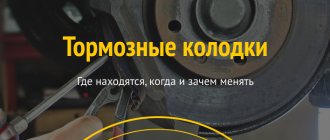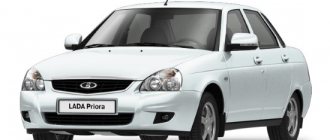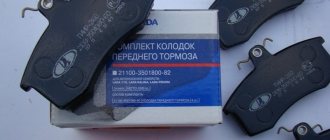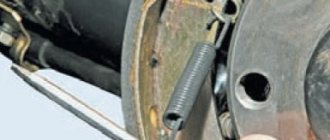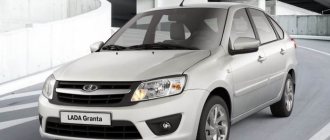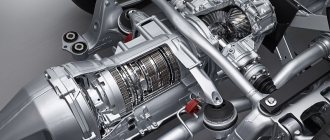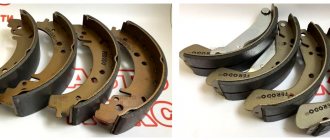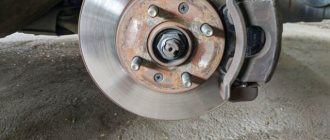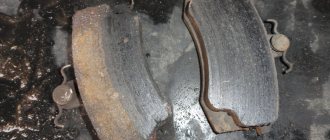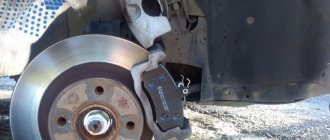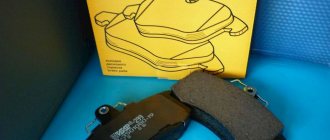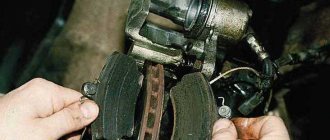Welcome, friends, to the DIY car repair website. Every car enthusiast, and indeed any car owner, tries to monitor its condition and conducts diagnostics in order to promptly identify one or another malfunction.
Brake pads
Sometimes it happens that new cars have squeaking brakes. How can you determine why brake pads squeak and how can you fix such problems?
How does a brake caliper work?
In ideal condition, the brake caliper should operate as follows:
- The driver inside the car presses the brake pedal;
- At this moment, pressure is built up inside the brake line and it is transmitted to the piston group of all calipers;
- The calipers, under the influence of pressure, bring the brake pads to the disc mounted directly on the rotating wheel;
- Due to the frictional force that arises, the rotation of the disk, and at the same time the wheel, slows down.
Important: for proper operation of the brake system, the pads must be positioned strictly parallel to the brake disc.
Because friction occurs when a vehicle brakes, it also generates heat, which warms the brake pads, fluid, and calipers. Accordingly, a working brake caliper must consist of a material whose properties do not change when heated. Also, the caliper material must be strong to withstand heavy loads.
Reasons why brakes squeak
Low quality
It is possible that the pads you bought are not original, especially if they were purchased somewhere on the market or if they were replaced by a car service with a dubious reputation. In this case, everything is very simple - change the brake pads and the squeaking along with the whistle disappears. If this is not done and ignored, then over time the brake disc will fail, in the end you will have to spend a lot more, and the repair itself will be much more difficult. I advise you to buy brake pads in branded stores or from dealers who have all the certificates confirming the quality and authenticity of these products.
Why does the brake caliper squeak and jam?
A signal that there are problems with a car caliper is a squeaking sound. It may indicate that the caliper is worn out and needs to be replaced, or that a part needs diagnostic maintenance. The squeaking sound when calipers operate most often occurs for one of the following reasons:
The pads are not installed correctly. If the pads are not parallel to the brake discs (or are not in the right place, for example, due to an error during repair), this can lead to squeaking;
- Worn brake discs, which are also directly involved in the braking process;
- There is no lubricant or the lubricant selected is incorrect. Often, drivers (and private services) save on grease for calipers, which is absolutely not allowed. The fact is that it is necessary to select for the caliper not only a lubricant with the ability to cool and prevent friction. Also, the caliper lubricant must be resistant to external influences, especially in winter, when there is a lot of dirt and salt on the road.
The situation is critical when the brake caliper not only creaks, but jams during operation. In other words, the driver presses the brake pedal, and when it is released, the caliper does not remove the pads from the brake discs, which leads to uncontrolled braking of the car, excessive wear and overheating of parts in the brake mechanism.
Tips and tricks for novice drivers
The above list of actions should save you from further squeaks, whistles and squeals from the brake system. However, if only a temporary solution to the problem appears, simply contact the nearest car service center, where they will offer you a full diagnosis of all components of the brake system and identify the malfunction.
Remember:
- It is necessary to replace old pads with new ones after every 75-100 thousand km of the vehicle.
- Buy brake pads and rotors of the same brand and type as the original ones on the car.
- When driving on wet roads, squealing brakes are not uncommon, so dry the brakes a little first.
- To check the serviceability of the pads, perform about 5-10 gradual braking at low speeds.
- Any set of new spare parts, including the brake system, requires a certain amount of time to break in.
What to do if the caliper creaks or jams
If the brake caliper creaks or jams, and the part is in good condition, you can try to fix the problems yourself. To do this, it is recommended to perform the following set of actions:
- The first step is to unscrew the brake caliper; to do this, you need to put the car on a jack and remove the wheel. It is worth noting that in some car models the caliper can be unscrewed counterclockwise;
- Having removed the caliper, unscrew the piston using a wrench, then it must be pulled out of the cylinder;
- The removed parts must be carefully inspected for chips, rust, corrosion and various damages. If rust is found, it needs to be cleaned well. When the calipers are heavily worn, problems may arise with cleaning the rust with improvised means; in such a situation, the part will need to be sanded;
How to avoid caliper failure
The procedures described above for completely cleaning the caliper are very complex and require a lot of time. To ensure that they are carried out as rarely as possible, be sure to lubricate the caliper surface with special grease or WD-40 every 6 months to avoid corrosion.
It is also recommended to inspect the caliper annually for corrosion, damage, dirt, and boot rupture.
Welcome! Brake cylinders - thanks to them, braking is carried out, and without the pistons that are in them, these cylinders will not work at all, so if a piston fails, then you have to go to a car store and buy a new brake cylinder, because driving without brakes is scary and even more dangerous , but not in all cases the pistons stop working forever, sometimes they can be revived, and we will write in detail about how to do this in this article.
Note! To work, you will need to stock up on: A jack to lift any side of the car, as well as a wheel wrench and you may also have to stock up on bricks, and you may also need a basic set of wrenches and sockets!
Summary:
How to understand that the pistons of the brake cylinder are not working? Let us answer this question before we move on to the repair of pistons, namely inoperative (That is, the pistons do not move in the cylinder), the pistons are recognized if they do not move at all and stand in one place, as a result of which the car, namely the brakes, begins a number of problems occur, that is, the car cannot drive normally because it constantly slows down even though you don’t press the brake pedal at all, or it may be that the car will drive but it will brake much worse than it should, in general, let’s figure it out Why do these cylinder pistons fail?
From time to time, the sealing ring (indicated in the photo below by an arrow) that fits the piston in a circle either wears out, or micro cracks form in it through which dirt begins to get into the piston itself, where the lubricant is located, and as a result the piston becomes unusable.
And also, the piston can simply sour in the brake caliper, and this can happen because of our roads, which in winter are mostly sprinkled with sand and salt, and the brake system is located in the very bottom of the car and therefore is subject to heavy braking. and in general, when moving, all this salt flies which little by little brings the situation to the point where the piston simply rusts, otherwise it simply sours, and therefore it will then be very difficult to move it from its place and thus it stops moving and therefore stops working.
By the way, you can very easily understand if your piston is somehow soured, if your car’s fuel consumption on the highway increases, and also if the car, as already mentioned earlier, starts to drive worse, and also if you notice that In neutral gear, the car began to slow down a little, this can also be understood if the car begins to skid on a winter road from braking, all this indicates that your piston has stopped working.
Grinding noise when braking. The main causes of squeaking brakes.
The problem of grinding noise when braking affects every motorist from time to time. Of course, a long whistle when braking is frightening and alarming. But is it always necessary to immediately go to the nearest service center or even call a tow truck for this? In most cases, yes. The creaking of brakes (pads) is in any case a sure signal of a malfunction of one of the most critical components of the car, directly related to your safety. Let's try to look at the four main reasons why car brakes squeak?
Brakes squeak not only when braking, but also while driving.
Brake pads are equipped with special metal “petals”; when the surface of the pad wears off during operation, the “petal” touches the disc and a nasty grinding noise from the brakes occurs. This was done on purpose - to reliably indicate that it is time to replace the pads. In addition, some cars have a special sensor - a warning light, and if it is necessary to replace the brake pads, it lights up.
How can you check for yourself whether your brakes are squeaking due to wear?
If your car has disc brakes, you can simply try turning the steering wheel all the way to the side and shining a flashlight on the pad, you can “by eye” determine the thickness of the pad. If the thickness is more than decent, and the brakes squeak when driving, you need to immediately contact a service station. If it seems difficult for you to determine the thickness of the pads by eye, immediately contact your nearest service center to check for pad wear.
The thickness of the block is easily determined by eye.
The thickness of the block is easily determined by eye.
The squealing of brakes (pads) occurs due to their vibration.
When braking, a strong vibration is naturally created in the area of action of the pad and brake disc, resulting in squeaks and even prolonged “squeals”. Usually, in order to avoid extraneous sounds, a special “anti-creaking” plate is installed between the pad and the caliper piston, which absorbs vibration. It happens that in some service stations that are not entirely clean, they simply lose such pads or throw them away on purpose, so that the client would quickly come to them with a new problem - whistling brakes and change practically new pads.
It happens that the old plate has rusted and collapsed, but the new one is not included in the set of pads, and it had to be ordered as a separate item. The advice here is simple - if you recently changed the pads at a service station and the brakes started squealing again, then simply contact another service center to make sure that the work was carried out exactly with all the requirements.
New pads squeak, what should I do?
In addition to the lack of an “anti-squeak” plate, there are other reasons why new, just replaced, pads begin to creak disgustingly. Firstly, you should pay attention to the quality of manufacture of the pads themselves; you must not skimp on such an issue as the brake system, and take only original consumables. It happens that the pads just need to be properly grounded, and after a couple of days (usually up to a week of intense driving) the squeak will disappear on its own.
If the whistling sound of new pads does not disappear for a long time, this is a good reason to contact a service station, because There is very little chance that the problem with extraneous brake noise will resolve on its own.
I drove into the mud and the pads began to creak!
Another classic problem is grinding brakes - liquid dirt or clay gets into the working surface of the brake pads, dries out and makes terrible sounds - from a squeak to a prolonged howl! Therefore, if you encounter a squeaking problem after an off-road trip (you drove from a federal highway onto a local road somewhere in the outback). It is necessary to remove the wheel, wash it well, clean the caliper and brake system elements (except for the friction surface) with a wire brush, and then use a special tool for cleaning brake discs.
The pads are fine, but the brakes still squeak.
The pads may whistle if they have lost mobility in the caliper, that is, they have become sour. In this case, lubricant will help, don’t laugh, brake lubricant. And not one, but two and both are anti-creaking. For the “floating” caliper to work, it is necessary to lubricate the caliper guide pins with a thin layer of Liqui Moly Anti-Quietsch-Paste (article 7656, red). And not on top of the old grease, but by carefully removing the old and degreasing the surfaces using Schnell-Reiniger (article 1900). The caliper grooves into which the pads are inserted must also be thoroughly cleaned and lubricated with Liqui Moly Bremsen-Anti-Quietsch-Paste (article 7585, blue). To complete the service, it is worth cleaning and degreasing the brake disc itself using Schnell-Reiniger (part number 1900). All these simple measures keep the brake mechanisms in constant tone, and the brakes no longer emit howling, squeaking or grinding noises!
Brake care technology is described in more detail in the special section Brake System Maintenance.
Take care of your car, and it will definitely thank you!
You can buy our products near your home from one of our partners - Liqui Moly products on the map of your city.
